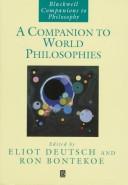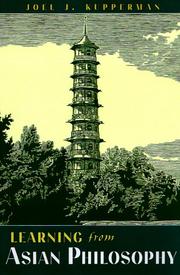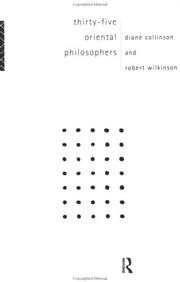| Listing 1 - 10 of 187 | << page >> |
Sort by
|
Book
ISBN: 9782870377420 2870377428 Year: 2012 Publisher: Namur: Presses universitaires de Namur,
Abstract | Keywords | Export | Availability | Bookmark
 Loading...
Loading...Choose an application
- Reference Manager
- EndNote
- RefWorks (Direct export to RefWorks)
Filosofie [Oosterse ] --- Oosterse filosofie --- Oriental philosophy --- Philosophie orientale --- Philosophy [Oriental ] --- Metaphysics --- History --- 20th century

ISBN: 0631198717 Year: 1997 Publisher: Oxford : Blackwell,
Abstract | Keywords | Export | Availability | Bookmark
 Loading...
Loading...Choose an application
- Reference Manager
- EndNote
- RefWorks (Direct export to RefWorks)
Philosophy, African --- Philosophy, Asian --- Asian philosophy --- Oriental philosophy --- Philosophy, Oriental --- African philosophy

ISBN: 0585351066 1280472073 0198029411 1602566623 9780585351063 9780198029410 0195128311 019512832X 9780195128321 9780195128314 0195128311 9780195128314 Year: 1999 Publisher: New York : Oxford University Press,
Abstract | Keywords | Export | Availability | Bookmark
 Loading...
Loading...Choose an application
- Reference Manager
- EndNote
- RefWorks (Direct export to RefWorks)
Showing how philosophical topics can benefit from interaction with Asian philosophy, this text explores: the formation of the self as an ethical problem; the fluidity of the self; the ethical nature of choice; the scope and demands of ethics.
Philosophy, Asian. --- Philosophy, Comparative. --- Comparative philosophy --- Asian philosophy --- Oriental philosophy --- Philosophy, Oriental --- Philosophy, Asian --- Philosophy, Comparative
Book
ISBN: 9811617147 9789811617140 9811617139 Year: 2021 Publisher: Gateway East, Singapore : Springer,
Abstract | Keywords | Export | Availability | Bookmark
 Loading...
Loading...Choose an application
- Reference Manager
- EndNote
- RefWorks (Direct export to RefWorks)
This book considers the Chinese conception of beauty from a historical perspective with regard to its significant relation to human personality and human existence. It examines the etymological implications of the pictographic character mei, the totemic symbolism of beauty, the ferocious beauty of the bronzeware. Further on, it proceeds to look into the conceptual progression of beauty in such main schools of thought as Confucianism, Daoism and Chan Buddhism. Then, it goes on to illustrate through art and literature the leading principles of equilibriumharmony, spontaneous naturalness, subtle void and synthetic possibilities. It also offers a discussion of modern change and transcultural creation conducted with particular reference to the theory of the poetic state par excellence (yi jing shuo) and that of art as sedimentation (ji dian shuo). Keping Wang is a Senior Fellow of Chinese Academy of Social Sciences (CASS), and Emeritus Professor of CASS University. His recent publications are Harmonism as an Alternative (2019), Chinese Culture of Intelligence (2019), and Rediscovery of Sino-Hellenic Ideas (2016).
Philosophy, Chinese. --- Philosophy, Asian. --- Asian philosophy --- Oriental philosophy --- Philosophy, Oriental --- Chinese philosophy
Book
ISBN: 1108457487 1108558216 1108682200 110859834X Year: 2022 Publisher: Cambridge, England : Cambridge University Press,
Abstract | Keywords | Export | Availability | Bookmark
 Loading...
Loading...Choose an application
- Reference Manager
- EndNote
- RefWorks (Direct export to RefWorks)
This Element selectively examines a range of ideas and arguments drawn from the philosophical traditions of South and East Asia, focusing on those that are especially relevant to the philosophy of religion. The Element introduces key debates about the self and the nature of reality that unite the otherwise highly diverse philosophies of Indian and Chinese Buddhism, Hinduism, and Jainism. The emphasis of this Element is analytical rather than historical. Key issues are explained in a clear, precise, accessible manner, and with a view to their contemporary relevance to ongoing philosophical debates.
Philosophy, Asian. --- South Asia --- East Asia --- Religion. --- Asian philosophy --- Oriental philosophy --- Philosophy, Oriental --- Philosophy and religion.
Book
Year: 1977 Publisher: New York, NY Horizon Press
Abstract | Keywords | Export | Availability | Bookmark
Book
ISBN: 9739682502 Year: 1995 Publisher: Cluj Biblioteca Apostrof
Abstract | Keywords | Export | Availability | Bookmark
 Loading...
Loading...Choose an application
- Reference Manager
- EndNote
- RefWorks (Direct export to RefWorks)
History of philosophy --- Filosofie [Oosterse ] --- Oosterse filosofie --- Oriental philosophy --- Philosophie orientale --- Philosophy [Oriental ] --- Philosophie --- Transition --- Noica, Constantin
Book
ISBN: 1137532173 1349709204 Year: 2016 Publisher: New York : Palgrave Macmillan US : Imprint: Palgrave Macmillan,
Abstract | Keywords | Export | Availability | Bookmark
 Loading...
Loading...Choose an application
- Reference Manager
- EndNote
- RefWorks (Direct export to RefWorks)
This book reinterprets classical Chinese philosophical tradition along the conceptual line of human dignity. Through extensive textual evidence, it illustrates that classical Confucianism, Mohism, and Daoism contained rich notions of dignity, which laid the foundation for human rights and political liberty in China, even though, historically, liberal democracy failed to grow out of the authoritarian soil in China. The book critically examines the causes that might have prevented the classical schools from developing a liberal tradition, while affirming their positive contributions to the human dignity concept. Analysing the inadequacies of the western concept of human dignity, the text covers relevant teachings of Kongzi, Mengzi, Xunzi, Mozi, Laozi, and Zhuangzi (in comparison with Rousseau). While the Confucian notions of humanity (Ren), righteousness (Yi), and gentleman (Junzi) bear most directly on the conception of dignity, Mohism and Daoism provide salutary corrections to the ossification of the orthodox Confucian practice (Li).
Philosophy, Asian. --- Philosophy, Chinese. --- Dignity --- Philosophy. --- Human dignity --- Chinese philosophy --- Values --- Non-Western Philosophy. --- Asian philosophy --- Oriental philosophy --- Philosophy, Oriental
Book
ISBN: 9811329656 9811329648 Year: 2019 Publisher: Singapore : Springer Singapore : Imprint: Springer,
Abstract | Keywords | Export | Availability | Bookmark
 Loading...
Loading...Choose an application
- Reference Manager
- EndNote
- RefWorks (Direct export to RefWorks)
The proposed book presents an overview of select theories in the classical Vaiśeṣika system of Indian philosophy, such as the concept of categories, creation and existence, atomic theory, consciousness and cognition. It also expounds in detail the concept of dharma, the idea of the highest good and expert testimony as a valid means of knowing in Vaiśeṣika thought. Some of the major themes discussed are the religious inclination of Vaiśeṣika thought towards Pasupata Saivism, the affiliation of the Vaiśeṣika System to the basic foundations of Indian philosophical thought, namely Veda and Yoga, and their insights into science, hermeneutics and metaphysics. In addition, this book includes recent Sanskrit commentaries on key Vaiśeṣika texts and provides a glimpse of Vaiśeṣika studies across the world. Overall, this book enunciates the Vaiśeṣika view from original sources and is an important work for Vaiśeṣika studies in current times for serious students as well as researchers. .
Philosophy, Asian. --- Hinduism. --- Civilization-History. --- Non-Western Philosophy. --- Cultural History. --- Religions --- Brahmanism --- Asian philosophy --- Oriental philosophy --- Philosophy, Oriental --- Civilization—History.

ISBN: 1280332611 0203029356 0203159802 9780203159804 9780203029350 9781134973606 1134973608 9780415025966 0415025966 0415025966 9786610332618 6610332614 9781134973552 9781134973590 9780415513180 1134973594 9781280332616 Year: 1994 Publisher: London ; New York : Routledge,
Abstract | Keywords | Export | Availability | Bookmark
 Loading...
Loading...Choose an application
- Reference Manager
- EndNote
- RefWorks (Direct export to RefWorks)
These are questions to which oriental thinkers have given a wide range of philosophical answers that are intellectually and imaginatively stimulating. Thirty-Five Oriental Philosophers is a succinctly informative introduction to the thought of thirty-five important figures in the Chinese, Indian, Arab, Japanese and Tibetan philosophical traditions. Thinkers covered include founders such as Zoroaster, Confucius, Buddha and Muhammed, as well as influential modern figures such as Gandhi, Mao Tse-Tung, Suzuki and Nishida. The book is divided into sections, in which an in
Philosophy, Asian. --- Philosophers --- Religious biography --- Religions --- Biography --- Spiritual biography --- Scholars --- Asian philosophy --- Oriental philosophy --- Philosophy, Oriental --- Asia --- Religion.
| Listing 1 - 10 of 187 | << page >> |
Sort by
|

 Search
Search Feedback
Feedback About UniCat
About UniCat  Help
Help News
News